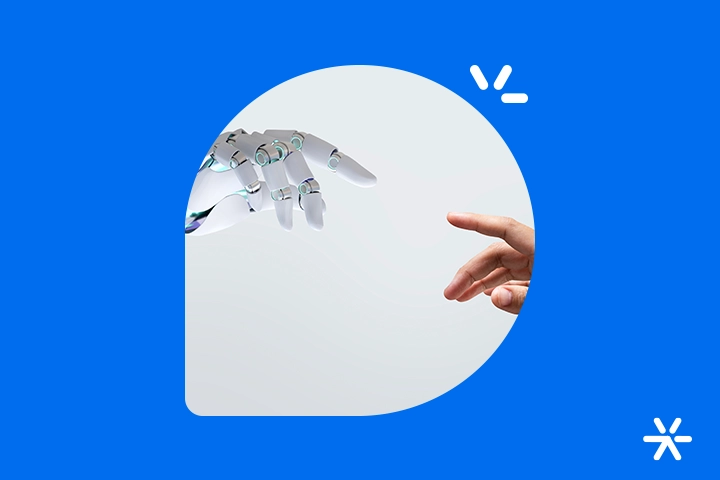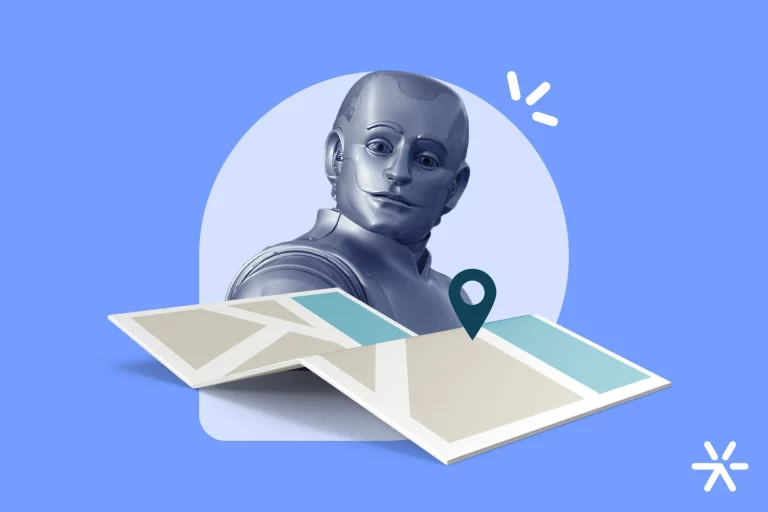Google AI: The End of SEO?
Google’s AI has simply arrived.
It seems like just yesterday we were all here pondering what impacts AI would have on organic search, and now, suddenly, it’s all out there for everyone to see.
Google’s AI comes as a complete package. Among all the AIs today, it’s the only one capable of offering the integrations it does.
It was supposed to be the only one to offer a search system along with generative AI, but OpenAI, not wanting to be left behind, also integrated its own search system into ChatGPT.
Still, among all the alternatives on the market and even compared to ChatGPT itself, there’s no AI today capable of competing with what Google is offering.
It takes courage to say that! But it’s true, and I’ll prove this point now, throughout the article.
Ready to start? First, let’s go over the basics: what does Google’s AI offer, and why is it the best so far?
Then we’ll discuss in more detail the future of SEO with Google AI’s arrival. Let’s go!
What Does Google’s AI Offer?

Google’s AI, or Gemini (let’s refer to it this way from now on), is a complex system with three main fronts:
- Search: Gemini is directly integrated into the SERPs, answering user questions before all organic and paid results. This is currently the greatest fear of organic traffic.
- Google Workspace: Google also offers a Gemini subscription for Workspace, where you can use generative AI directly in Google documents.
- Google Ads: In addition to these areas, Google also provides a chatbot with Gemini for Google Ads. You can ask the chatbot anything related to Google Ads campaigns and get real-time instructions.
Being a Natural Language Processing AI, Google’s AI can answer any question and deliver any result a person requests, as long as the answer exists in its database.
The thing is, this database is Google itself, which today is practically synonymous with the entire internet.
It’s precisely because of this database, this integration with Google products, and this chatbot on Google Ads that Gemini is the most complete AI on the market today.
Let’s go over each of these points in more detail now. Stay with me:
Gemini Directly in Google Search
Gemini is already active in most Google searches today here in Brazil.
See the screenshot below:
This is the Gemini result. Its structure is quite simple:
- A main box with the result generated through Generative AI;
- A side box with the sources used to display the result.
Gemini uses the first page’s results to create its summary and displays the links used for the research on the right side of the page.
And here’s something interesting: in addition to showing the links on the right side, they are also displayed again in the classic Google format, below the main result.
This Gemini feature is the most controversial of all. It’s what’s “threatening” SEO.
And not only SEO: ad performance might also suffer some impacts, as Google’s very first result, once reserved for ads or the featured snippet — which wasn’t as common as Gemini — now belongs to the AI.
This is an issue of space, usability, and interface. What Google is doing is directing all user attention to the AI — everything else comes after.
This has actually been happening for some time now. Featured snippets, Google Shopping, and video resources — all are part of Google’s strategy to keep users on the search engine.
And that’s what’s happening with Google’s AI, too, the prioritization of users within the search engine itself.
No judgments yet! We’ll talk more about the future of SEO throughout the article. For now, let’s take a closer look at the other two Gemini functionalities:
Gemini in Google Workspace
Gemini in Google Workspace works in Gmail, Google Docs, Google Sheets, Google Meet, Google Slides, and in Gemini’s dedicated app — similar to ChatGPT.
Its primary uses for creativity and collaboration are in Docs, Sheets, Meet, and Slides.
For documents (Docs, Sheets, and Slides), the AI functions almost like a ChatGPT for the document and platform.
For example: instead of searching the internet for the formula to organize a column, you can ask the AI to provide it based on a simple description.
If someone asks you to add a VLOOKUP in a Google Sheet, but you’re unsure how or what the corresponding function is in Google, the AI can tell you the appropriate function and even show you how to use it directly in the document.
For creative production, Gemini can perform research directly in the document and deliver the result already formatted.
In emails, Gemini helps you craft the ideal message, as it’s directly incorporated into the editor and even the inbox, helping you filter received messages.
In Google Meet, its primary function is to offer transcriptions, but it also provides in-call support — no more screen sharing to Google something, just ask the AI.
The main drawback of Gemini in Google Workspace is that the service is paid.
But this is common among today’s AIs. Many other AIs on the market offer similar services and charge even more.
Speaking of prices, I’ll let Gemini answer this one itself. Here’s its time to shine:
- Gemini Advanced: Access to the Gemini 1.0 Ultra model for R$96.99 per month. This advanced version is recommended for complex actions, such as programming and logical reasoning.
- Gemini Business: Costs USD 24 per user per month on a flexible plan or USD 20 per user annually.
- Gemini Enterprise: Costs USD 36 per user per month on a flexible plan or USD 30 per user annually.
- Gemini Code Assist: Costs USD 19.00 per user per month, with a 12-month commitment.
- Gemini 1.5 Flash: Costs USD 35 for 1,000 requests, with a daily limit of 1 million requests.
Gemini in Google Ads
In Google Ads, Gemini operates as a chatbot with Natural Language Processing.
In fact, here at Leadster, we have a chatbot that does the same thing, but instead of being in Google Ads, it’s applied on your site and uses your database.
The functionality in Google Ads is fascinating and isn’t any simpler just because it’s “only” a chatbot.
In fact, it’s precisely because it’s a chatbot that it’s even more advanced.
Google Ads is a highly complex tool that becomes more complicated as you learn to use it and discover its deeper functions.
A chatbot in this case works almost like Copilots for programmers, such as those by ChatGPT, GitHub, and even Microsoft, which, although not as popular, is still an incredible tool.
But instead of coding, it’ll help you create campaigns.
As with these Copilots, Gemini for Google Ads works best if you have at least a good understanding of Google Ads’ functioning.
Knowing what a campaign is, for example, will help a lot.
However, even if you ask “what is a campaign?” the chatbot can guide you on a hands-on discovery journey that’s much more interactive than watching Google’s courses.
Alright, now that we’ve discussed the main features of Gemini on Google, we also need to understand what it represents in the Brazilian market.
What changes? How is it being accepted? Let’s dive deeper into this conversation now. But first, a quick break:

Everything We’ve Discussed About AI on Leadster’s Blog
In the next section, we’ll delve deeper into Gemini’s acceptance worldwide and also what’s being said about it in Brazil.
This will be crucial to understanding the future of SEO, which, in reality, isn’t even that much of a “future,” so to speak.
But no spoilers. And just as it’s essential to understand this landscape to grasp what users truly want from Google, it’s also crucial to understand AI.
We’ve been discussing AI here on the Leadster blog since the first launch of ChatGPT, back in the middle of the pandemic.
This is because, in addition to our interest in the topic, AI is simply one of the main points of transformation in digital marketing.
To understand it well, it’s necessary to go beyond the basics and tutorials, and understand the people who use AI, why they use it, or why they don’t.
Anyway, take a look at some important topics in the links below. You don’t need to read them now, but once you finish this article, it’s worth it:
➡️ 22 Artificial Intelligence Tools to Create Images
➡️ How to Use Artificial Intelligence in Every Segment
➡️ Artificial Intelligence Applied to Business: Fact or Fake?
➡️ What is Artificial Intelligence and How to Apply It in Your Business
➡️ Content Creation with Artificial Intelligence: How to Do It?
Alright, as we were saying, Google AI should be approached from the user’s perspective, not from the SEO perspective.
And that’s exactly what we’re going to do now, in the next section. Take a look:
The Acceptance of Gemini in Brazil — Do People Prefer AI or SEO?

This is the main question we, as marketing professionals, need to ask ourselves — what if people prefer AI?
According to a survey by Infomoney, Brazil was the country that used AI the most in 2023.
We are naturally curious and tend to have an optimistic, interested attitude toward new market trends.
This is confirmed by this study from O Globo, which showed that most Brazilians have a positive opinion of AI:
Interestingly, the biggest point of contention with AI — the reliability of the information — didn’t generate much concern among the Brazilian public. Most people trust the information it provides.
Unfortunately, we don’t yet have enough data to determine the level of acceptance of Gemini in the search engine directly, but we know enough to speculate a bit.
How about we do just that now?
The SEO Paradox
At some point in the early 2000s, SEO was “discovered” — it gained immense popularity and became the primary way Google brought articles on various topics.
At the same time, though, SEO brought a serious problem: the possibility of gaming Google.
For a long time, SEO really was a game — you got the technical aspects right, used a certain number of keywords, distributed them well, included links, and voilà: your article was ready to be indexed in the top positions.
And with many people buying and selling backlinks — a significant factor in Domain Authority, the main metric for indexing at the time — the top results weren’t always the best articles.
This gradually changed in some niches, but in others, the situation reached extreme levels, making it difficult to find accurate information on Google, even when all content was 100% human-written.
Ranking on Google has always been the main goal of SEO, but instead of focusing on informative ranking methods, many brands concentrated on technique.
This created a paradox: Google and its wealth of information were built through SEO over the years.
But even though we now have a vast sea of content in front of us, we realize it’s a shallow one.
This has actually contributed to the rise and popularity of AIs. The way AIs write today was trained using internet content, which wasn’t created with information as the primary goal but with an overwhelming need to rank at all costs.
The Decline in Google Quality Could Make AI a Savior
One of the most common complaints against Google is the low quality of search results.
At this point, AI doesn’t help much: it doesn’t deliver results better than organic ones. AI text isn’t necessarily better than the articles published and indexed on the first page.
Mainly because, as we’ve seen, AI provides a summary of the indexed articles in good positions.
But AI provides a summary not optimized for SEO, whereas most first-page results prioritize SEO.
In other words, the AI article ends up being better than the SEO article because it’s more concise and well-presented.
If you want to know why your refrigerator is making noise, AI responds without beating around the bush, while many SEO articles will start by explaining what a fridge motor is, what insulation is, how the gas is transported, etc.
This leads to comments like this on Reddit:
Or even more colorful ones like this:
Even older discussions about the “state of Google” come with AI recommendations that do precisely the job of summarizing articles:
At that time, Google AI didn’t even exist.
The truth is, Google as a search tool has been criticized for some time, much of it also due to SEO, which contributed to the decline in result quality.
Yes, we’re going to discuss this in this article. SEO has indeed been a villain in several segments, even if it was the hero in others.
Is Google AI the End of SEO?

To answer quickly: no.
Gemini doesn’t signify the end of SEO or the end of blogs as a great strategy to generate leads.
But it does certainly make the landscape much more complicated.
For a while, it was even complicated for us here at Leadster — in the months following Gemini’s launch, we saw traffic drops of up to 20%.
And it wasn’t just us. Other brands we consulted faced the same problem.
Every year someone kills SEO. The Helpful Content of 2022 and 2023 killed SEO, then ChatGPT killed SEO, and now Gemini is killing SEO again.
The truth is that SEO will only die the day Google dies. It depends on other brands’ article production to exist. Even Gemini: it only responds based on information already on Google.
Our CMO, Gustavo Luby, even recorded a super interesting video on this topic. It’s worth watching below. And keep reading as we dive deeper into this topic right after:
Search Has Been Changing for a Long Time
The truth is that classic SEO has been dying for some time.
Classic SEO is what we described throughout this article: prioritizing ranking above all, with information as a secondary concern.
Here’s an example to clarify: an agricultural supplies brand wants to put a landing page at the top position on Google.
This brand will analyze its competitors in the SERP and identify points it absolutely must include on its LP — everything its competitors do, it also has to do.
But beyond that, it needs to add something different, something no other brand has.
Given a technical parity between the brand and its competitors, this is enough to place it at the top of Google.
That’s classic SEO. But it emerged in a time when YouTube didn’t have as much prominence, TikTok didn’t exist, social media wasn’t dominated by influencers, etc.
In other words, Google was the only research source.
Today, this has changed a lot. People are using other tools for search. Reddit and TikTok are prime examples.
Traditional Google content is lengthy and often drags on for 700 words to deliver a 50-word answer.
This model is dying, but not because of Google. Gemini is a response to this. It doesn’t want people searching “how to remove ingrown toenail Reddit” or “how to get a driver’s license TikTok.”
It wants people to just ask and for the search engine to deliver a better answer than these other tools.
So what happens to sites, landing pages, and extensive content? That’s what we’ll discuss now:
Google is Begging for New Forms of Content
Alright, this may be colorful language, but it’s true, and you’ll agree with me.
Google literally asked brands to focus on creating informative content with user experience as the primary concern in the 2023 Helpful Content Update, the largest in the series, which later became part of the Core Update.
It even went as far as adding an extra E to the E-A-T standard — the E for Experience. Now, this parameter that had existed for years is called E-E-A-T.
Google has never done this before. It has always had its general guidelines and set content rules, but it rarely specified what made good content, and it never asked for differentiated content.
This came after the launch of ChatGPT. The first Helpful Content update even specifically mentioned “AI-generated content,” stating that it would be deprioritized and, in extreme cases, deindexed.
In 2023, following the Helpful Content update, Google carried out a massive cleanup of spam sites, review farms, and many others that used SEO almost as a hack to gain more traffic.
And this resulted in a new requirement, accompanied by this request: please, create unique content!
The New SEO and the Future
There’s nothing “new” in the SEO of the future. Not at all.
In fact, the new SEO is a return to more traditional forms of copywriting and journalism.
We need to understand that Google is so ingrained in our lives that we’re not exactly writing for it but rather for the people who use it.
So, the future of SEO is to focus on those people.
Everything that’s written needs to have interactive elements, deep research, examples, screenshots, videos, and, most importantly, it needs to understand the search intent of readers.
Why would someone search for information on Artificial Intelligence, for instance? Why would someone click on my result about the topic? To dive deeper into the subject. In our case, to dive deeper and gain a perspective focused on marketing.
So, we need to anticipate readers’ needs. In this case, why write just anything explaining what AI is? Every article being read needs to be geared towards practical ways of using AI and its context in the market and in marketing.
The issue is that this is much more challenging than it seems.
Brands need to invest in good content and copywriting teams and do something they’ve never dared to do before: go beyond the basics, beyond SEO, and take more risks.
Have you ever thought about activating the power of AI on your website today?
And I’m talking about real power here: a chatbot similar to Gemini, but tailored to your website’s reality.
Let’s think of an e-commerce site: if someone has any question, they can chat with the chatbot about the product or category and receive natural responses, based on generative AI.
You can have this feature on your website today. Actually, not just today — you could have this feature installed and running on your site in 10 minutes. Starting now!
Try Leadster AI today by clicking on the banner below. The chatbot is free for 14 days, and you don’t even need a credit card to test it.
I’ll be waiting for you, alright? Thank you for reading, and I’ll see you in the next article!








